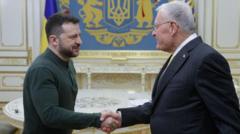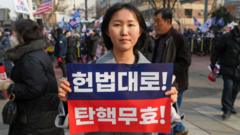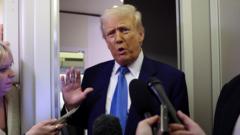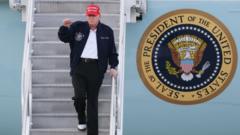As the U.S. imposes new tariffs under Donald Trump's administration, China remains restrained, seeking diplomatic avenues while gaining traction in global trade partnerships, potentially reshaping international relations.**
The Geopolitical Chess Game: Xi Jinping's Strategic Maneuvers Amid Trump's Tariff Tactics**
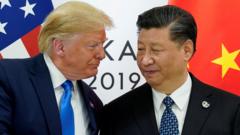
The Geopolitical Chess Game: Xi Jinping's Strategic Maneuvers Amid Trump's Tariff Tactics**
Analyzing Xi Jinping's potential opportunities as Trump implements new tariffs on China, revealing global implications and shifting alliances.**
As the United States initiates a new wave of tariffs, specifically a 10% levy on all Chinese goods, the implications of this economic maneuver ripple through global geopolitics. China, while frustrated, appears to be adopting a measured response to avoid alarming its citizens amid growing economic anxieties. Chinese leaders are cautious not to escalate tensions excessively, in contrast to Canada and Mexico, which have loudly vowed retaliation against U.S. tariffs.
The imposition of these tariffs follows a series of economic measures from Trump during his first term, signaling an ongoing tough stance against Beijing. However, expectant of a potential dialogue, both leaders are expected to engage in a call in the coming days. Analysts like Chong Ja Ian from Carnegie China point out that the percentage of the levy—10%—might not represent a significant strategic setback for China. Instead, it is viewed as an inconvenience that the Chinese government is willing to endure without provoking a contentious conflict unless substantial benefits can be garnered.
This far more muted angle of Beijing's response can also be viewed through the lens of opportunity. With divisions brewing within the United States itself due to Trump’s "America First" policies, Xi Jinping is reinforcing China's image as a calm and reliable global partner. Yun Sun from the Stimson Centre observes that any diminishment of U.S. global leadership directly benefits China, allowing it to reposition itself as a champion of global collaboration amid rising discontent with Washington's unilateral approaches.
Post-pandemic, Xi has been actively nurturing relationships worldwide, taking steps to reestablish China's role in global governance. His previous commitments to international institutions and initiatives signify China's readiness to fill any gaps left by the U.S., especially as American aid pauses continue to affect vulnerable nations.
While the imposition of tariffs raises alarms, it is also noteworthy that Trump’s administration has caused more profound disruptions at home and abroad during his first term. Critics highlight how such policies shift perceptions of the U.S. as a cooperative partner, pushing countries like Japan, South Korea, and Australia closer together in opposition to both Trump’s policies and a rising China. This growing apprehension sees newer alliances forming among Asian nations to counterbalance both economic dependencies and regional tensions.
With the Chinese New Year celebrations marking a moment of reflection, the restrained reactions from Chinese officials illustrate a calculated approach. While legal actions through the World Trade Organization are being considered, the efficacy of such measures remains questionable due to existing blockages in the system, especially those instituted under the previous U.S. administration.
As China continues to navigate this period of uncertainty, its long-term strategy appears focused on augmenting its influence globally while remaining cautious of Trump's erratic approach to foreign policy. The potential for cooperation and the eventual results of diplomatic efforts are seen as paramount, even as observers express skepticism about the future of U.S.-China relations, particularly with a team of influential hardliners in Trump's cabinet.
Xi's overarching narrative of win-win globalization stands in stark contrast to the uncertainty emanating from Washington, illustrating the strategic chess game unfolding on the world stage as these two superpowers grapple for dominance in the face of changing international dynamics.

